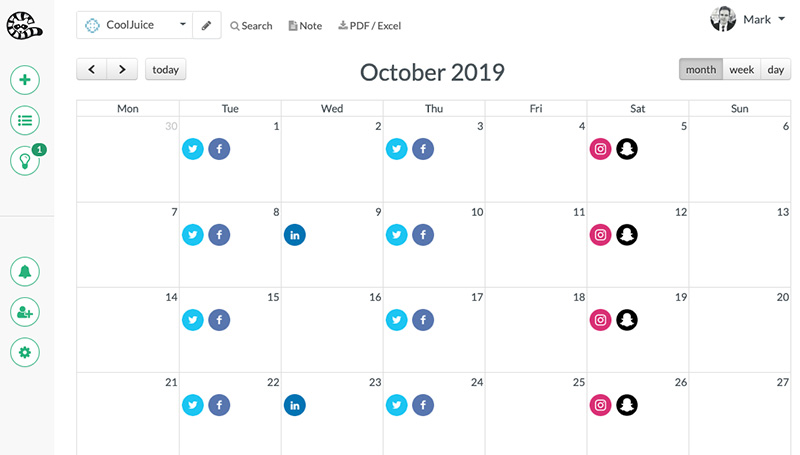A content calendar is a vital tool for any business or marketer that wants to maintain a consistent and effective content marketing strategy. It can help you plan, organise, and schedule your content across multiple platforms and channels, ensuring that you are always reaching your target audience with the right message at the right time. However, crafting the perfect content calendar is not always easy—there are several common pitfalls that can derail your efforts and prevent you from achieving your goals.
In this article, we will explore seven of these pitfalls and give tips on how to avoid them as you create your content calendar.
1. Not Setting Clear Goals
One of the primary reasons to create a content calendar is to help you achieve specific goals, whether it’s increasing website traffic, generating leads, or boosting brand awareness. However, many businesses fail to establish clear objectives and KPIs (key performance indicators) for their content marketing efforts. This can lead to a lack of focus and direction, making it difficult to measure success and make informed decisions about your strategy.
Pro Tip: Before you start crafting your content calendar, take the time to establish clear goals and KPIs for your content marketing strategy. This will help you stay focused and ensure that your content is always aligned with your objectives.
2. Failing to Plan for Different Channels and Formats
Your content calendar should encompass all of the different platforms and channels that you use to distribute your content, such as your blog, social media, email, and more. However, many businesses make the mistake of only planning for a single channel or format, which can limit your reach and prevent you from effectively engaging your audience.
Pro Tip: When creating your content calendar, make sure to plan for all of the different channels and formats that you use. This will help you create a more robust and diverse content strategy that reaches your target audience across multiple touchpoints.
3. Not Accounting for Seasonal Trends and Events
Your content should be relevant and timely to your audience, which means taking into account seasonal trends, industry events, and holidays. Failing to plan for these events can mean missing out on valuable opportunities to connect with your audience and generate leads.
Pro Tip: When creating your content calendar, be sure to include key dates and events that are relevant to your industry and audience. This will help you create content that is timely and resonates with your target market.
4. Overloading Your Team with Too Much Content
While it’s important to maintain a consistent content marketing strategy, it’s also crucial not to overload your team with too much work. Creating high-quality content needs significant time and effort, and trying to produce too much can lead to stress, burnout, and a decline in the quality of your output.
Pro Tip: Be realistic about your team’s capacity when planning your content calendar, and make sure you allocate sufficient time and resources for each piece. It’s better to produce a smaller amount of high-quality content than a large volume of poor-quality content.
5. Ignoring Data and Analytics
Your content marketing efforts should be informed by data and analytics, which can provide valuable insights into what types of content resonate with your audience and drive results. However, many businesses neglect to incorporate this information into their content calendar, leading to a less effective strategy.
Pro Tip: Regularly review your content performance and use this data to inform your content calendar. This will help you create more targeted and effective content that achieves your goals.
6. Overlooking the Importance of Evergreen Content
While timely and seasonal content is essential, it’s also important to include evergreen content in your content calendar. Evergreen content remains relevant and valuable to your audience over time, helping to drive consistent traffic and engagement.
Pro Tip: Make sure to balance your content calendar with a mix of timely and evergreen content, ensuring that you are always providing your audience with valuable information that meets their needs.
7. Being Too Rigid with Your Schedule
While a content calendar is essential for maintaining a consistent content marketing strategy, it’s also important to be flexible and adaptable. Unexpected events, changes in your industry, or shifts in your audience’s needs may require you to adjust your schedule or pivot your strategy.
Pro Tip: Be open to making changes to your content calendar as needed, and build in some flexibility to account for unexpected events or shifts in your strategy.
Conclusion
Crafting a robust and effective content calendar requires careful planning and consideration. By avoiding common pitfalls such as failing to set clear goals, not accounting for different channels and formats, and being too rigid with your schedule, you can create a content marketing strategy that delivers results and engages your audience. Remember to stay flexible, incorporate data and analytics, and balance timely and evergreen content for maximum impact.
Are you having trouble with quality content calendar planning? Then look no further than ContentCory! We are here to help you craft a comprehensive and effective content calendar that aligns with your business goals and engages your target audience. Our team of expert content strategists and marketers can help you avoid common pitfalls and develop a strategy that is tailored to your specific needs. Don’t let poor planning derail your content marketing efforts. Sign up today to start creating a content calendar that delivers results!


